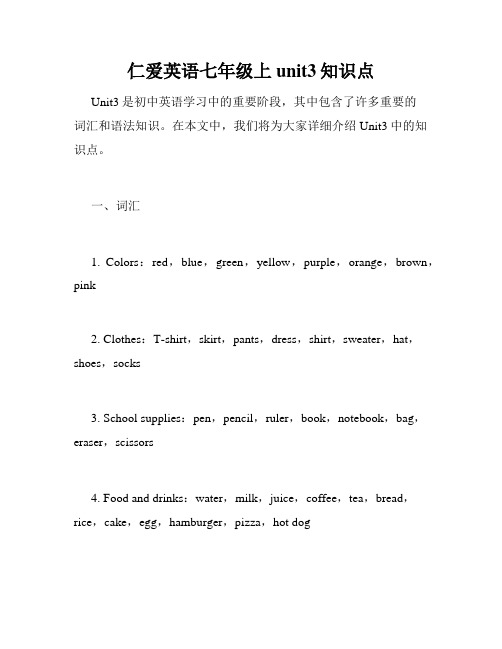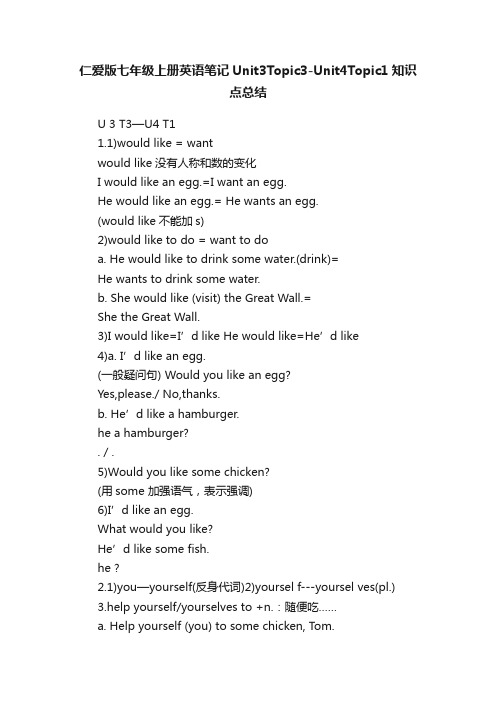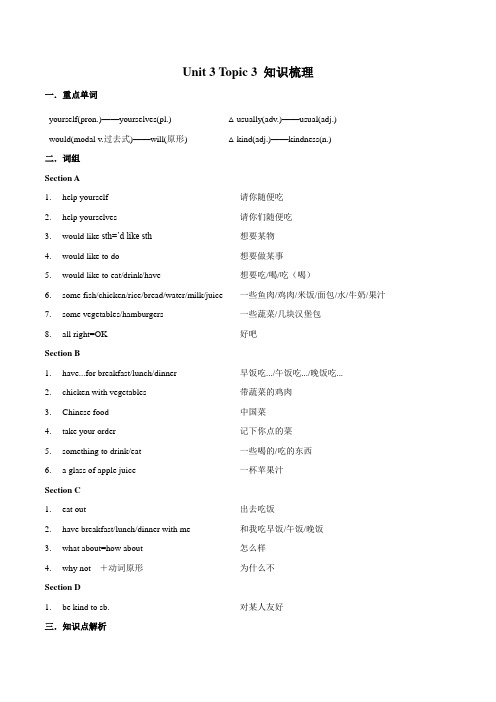仁爱版英语七年级上册Unit3知识点总结
- 格式:doc
- 大小:36.00 KB
- 文档页数:5

仁爱英语七年级上unit3知识点Unit3是初中英语学习中的重要阶段,其中包含了许多重要的词汇和语法知识。
在本文中,我们将为大家详细介绍Unit3中的知识点。
一、词汇1. Colors:red,blue,green,yellow,purple,orange,brown,pink2. Clothes:T-shirt,skirt,pants,dress,shirt,sweater,hat,shoes,socks3. School supplies:pen,pencil,ruler,book,notebook,bag,eraser,scissors4. Food and drinks:water,milk,juice,coffee,tea,bread,rice,cake,egg,hamburger,pizza,hot dog5. Family members:father,mother,sister,brother,grandfather,grandmother,uncle,aunt,cousin6. Numbers:one,two,three,four,five,six,seven,eight,nine,ten,eleven,twelve,thirteen,fourteen,fifteen,sixteen,seventeen,eighteen,nineteen,twenty二、语法1. 介词介词是英语中非常重要的语法部分,Unit3中包含了多个常用的介词,如in,on,at,with,to等。
这些介词的正确使用能够帮助我们更加准确地表达自己的意思。
例如:She is sitting on the chair.He is going to the store.The book is in the bag.2. 形容词和副词形容词和副词也是英语语法中的重要部分。
在Unit3中我们学会了很多形容词和副词,如big,small,happy,sad,fast,slow 等等。

仁爱版七年级英语上册Unit3知识点总结Unit 3: Getting XXXTopic 1: Basic Sentence Structures1.Asking for XXX:Excuse me。
could you please tell me your name?Sure。
my name is Jane.2.Asking for help:Could you help me with it?No problem.3.Asking about language proficiency:Does XXX?Yes。
he does./No。
XXX.4.Asking about the content of a letter:What does he say in the letter?5.Describing friendship:Jane。
Sally。
and I are good friends.6.Describing mutual help:We often help each other.7.Expressing different degrees of liking:Many students in our class like English a lot。
but I like it a little.What about you。
Sam?No。
I don't like English at all.Useful Phrases:9.Pen palXXX11.A lot12.Not。
at all13.Each other14.A little15.Very much16.A lot of17.Every dayPersonal Pronouns and Simple Present XXXXXX or things。
and they have ns in person。
singular or plural。

Unit 3 Topic 1 知识梳理一.重点单词△can(modal v..)——could(过去式)well(adv./adj.)——good(adj.)pen pal(n.)——penfriend(同义词)many(pron.+可数名词复数)——much(pron.+不可数名词) 二.词组Section Ae from= be from 来自于…2.help sb. with sth.= help sb. do sth. 帮肋某人做某事3.help me with my Chinese 帮助我学汉语4.no problem. 没问题5.speak Chinese / English very well 汉语/英语说得很好Section B1.know a lot about sth. 对某事很了解; 对某事知道得很多2.live in 居住在….3.in the letter 在信中4.want to do sth. 想要做某事5.visit Beijing 参观北京Section C1.like...a lot/very much 非常喜欢2.like...a little 有点喜欢3.help each other 互相帮助4.not…at all 一点也不; 根本不Section D1. a lot of+名词复数/不可数名词许多=many +名词复数/ much+不可数名词2. a lot of people 许多人3.every day 每天4.pen pal=penfriend 笔友5.read books 看书三.知识点解析Section A1. Excuse me, could you please tell me your name?请您把名字告诉我好吗?“Could you please ...?”是一种常用的委婉、客气的表达请求句型,用来征求别人的意见,是一种较为礼貌的用语,后接动词原形。

仁爱版七年级上册u3知识点
仁爱版七年级上册U3知识点包含6个主要部分,分别是“词汇”,“语法”,“听力”,“口语”,“阅读”和“写作”。
每个部分都涵
盖了学生需要掌握的基本知识点。
1. 词汇
本单元重点词汇包括国家、职业、动物、食物等。
学生需要掌
握这些词汇的意义、拼写、发音和用法。
同时,学生还需了解复
数形式和名词性物主代词的用法。
2. 语法
本单元语法重点为“there be”句型和“how many/much”问句形式。
学生需要掌握这两种语法结构的用法和用词的限制。
同时,学生
还需了解修饰词的用法,如限定词、形容词和副词。
3. 听力
本单元听力内容包括旅游信息和对话等。
学生需要通过听力训练来提高自己的英语听力水平。
同时,学生还需了解听力技巧,如注意力集中、预测和判断等。
4. 口语
本单元口语包括日常用语、问候和介绍等。
学生需要掌握这些口语表达的用法和正确发音。
同时,学生还需加强口语训练,如练习对话、模拟情境等。
5. 阅读
本单元阅读内容包括短文和对话等。
学生需要通过阅读理解来学习新词汇和语法结构。
同时,学生还需了解阅读技巧,如确定主旨、推理和固定句型等。
6. 写作
本单元写作任务为介绍自己所在城市。
学生需要运用本单元学习的词汇和语法来完成作文。
同时,学生还需注意用词准确、语法正确和结构合理。

仁爱版七年级上册英语笔记Unit3Topic3-Unit4Topic1知识点总结U 3 T3—U4 T11.1)would like = wantwould like没有人称和数的变化I would like an egg.=I want an egg.He would like an egg.= He wants an egg.(would like不能加s)2)would like to do = want to doa. He would like to drink some water.(drink)=He wants to drink some water.b. She would like (visit) the Great Wall.=She the Great Wall.3)I would like=I’d like He would like=He’d like4)a. I’d like an egg.(一般疑问句) Would you like an egg?Yes,please./ No,thanks.b. He’d like a hamburger.he a hamburger?. / .5)Would you like some chicken?(用some 加强语气,表示强调)6)I’d like an egg.What would you like?He’d like some fish.he ?2.1)you—yourself(反身代词)2)yoursel f---yoursel ves(pl.)3.help yourself/yourselves to +n.:随便吃……a. Help yourself (you) to some chicken, Tom.b. Help yourselves (you) to some chicken, kids.4.1)可数名词[C]:有单数和复数的形式.2)不可数名词[UC]:一般没有复数的形式.3)常见的不可数名词有:milk,rice,fish(鱼肉),chicken(鸡肉),(apple/orange) juice,water,bread5.fish:1)作为“鱼” , 是可数名词.fish—fish(pl.)2)作为“鱼肉”, 是不可数名词.some fish6.chicken:1)作为“鸡” , 是可数名词.a chicken2)作为“鸡肉”, 是不可数名词.some chicken7.some + n.(pl.),some+ [UC]some eggssome fish/chicken/milk/apple juice/rice8.---Help yourselves.---Thank you.9.---Would you like…? ---Yes, please. /No, thanks.10.What/How about +sb(宾格)/sth?What about him/her/some milk?11.All right.行,好吧(表示对别人的建议表示赞同)---I’d like some rice and chicken.---All right./doc/6e6981861.html,k for me.13.Me,too.14.表示建议:---What about …? ---Good idea.15.an ideaa good ideaHomework:1.I’d like a hamburger.(一般疑问句) a hamburger?(肯否回答) ./ .2.She’d like some orange juice.she ?3. , boys and girls.(随便吃些鸡肉吧)4.She likes it very much.(否)She it .5..(我想喝些牛奶).6.他们怎么样?Unit 3 T 3 Section B—D1.1)usually:70-80%,often:50-60%2)usually,often放在be之后,行为动词之前.I usually have breakfast at home.2.have…for breakfast/lunch/supper/dinner1)He usually has an egg and some milk for breakfast.2)We usually have some rice and chicken for supper.3.一日三餐前不加a/an/the,后不加s.What do you usually have for/ breakfast?4.1)He usually has some bread for lunch.What does he usually have for lunch?2)We usually have some juice and fish for dinner. usuallyfor dinner?5.have:1)有2)吃,喝:have milk/bread6.[UC]前面不加a/an/the,后不加s.He has / milk and/ bread for breakfast.7.What/How about +sb(宾格)/sth?8.with带着/有,(表示伴随关系)have chicken/fish with vegetables9.some rice10.three meals(餐):breakfast,lunch,supper/dinner11.food:[UC],食物的总称,作主语,谓语用单数.My favorite food is (be) chicken and fish.12.Chinese /English food13.wait(v.)—waiter(指人)(男服务员)---waitress(女服务员)14.take one’s orderMay I take your order?15.something to drink/eat1)修饰词如不定式(to do) ,形容词修饰something时,放在something之后.2)something:某事(肯定句)anything:任何事(否/疑问)nothing:没有什么事(表否定意思的陈述句)3)Would you like +something?Would you likesomething to eat ?16.[UC]表示数量的表达法:1)a glass of apple juice/watera bag of rice /milk2)a glass of apple juice---two/some glasses of apple juice3) a bag of milk---five bags of milk17.wait/just a moment18.Let me see.让我想一想.I see. 我明白了.19.1)Would you like some vegetables?2)some vegetables/rice20.something to drink21.banana juice----Section C1.eat out2.eat---eating(现在分词)3.would like to doWould you like to have (have) dinner with me?4.have / breakfast/lunch/supper/dinner5.with sb(宾格)6.Would you like to have lunch with him?7.Yes, I’d like/love to.(to不能省略)8.1)May/can I help you?=What can I do for you?2)情态动词may/can/could+动原May I help (help) you?9.sir—madam(对应词)10.What would you liketo eat (eat)?11.Why not+动原? =Why don’t you +动原?Why not study (study) with me? = Why don’t you study with me?12.表示建议:1)What about…? 2)Why not…?肯定回答:Good idea.13.Here you are.14.---Would you like sth to drink?---Yes,please./No,thanks.Section D1.in+地点: in China2.many+n(pl.)many friends3.1)all,bothall指三者或三者以上“都”both指两者“都”2)all,both放在be之后,行为动词之前They are all students.We all like school.4.be kind to sbThe teacher is kind to us.5.have dinner with them6.such as +若干例子7.Sichuan food8.be glad to do sthObama is glad to visit (visit) the Great Wall.9.1)here,there是介词,前不加介词.2)be here/thereI’m glad to be (be) here.10.let sb do sthLet me (I) see (see).Homework:1.他晚饭通常吃什么?he usually2.你可以点菜了吗?3.Tom,为什么不随便吃些汉堡包呢,?,Tom?4.你想喝些什么东西吗?来两杯香蕉汁. Would you like.5.She’s glad (be) there.6.I’d like (work) with you.7.Would you like something (say)?8.Why not (tell) him about it.= him about it.9.他对我很友善.He .10.I usually have some rice for lunch. usually for lunch?1.---Do you like…?---Yes, I like …very much/a lot/a little. (No, I don’t like …at all.)Section D1.at / homeHe has a dog at home.2.it’s, its(它是)(它的)a cat. name’s Mimi.3.Tommy =T om4.Zhou Lan likes it a lot.= Zhou Lan likes it very much. (否)Zhou Lan doesn’t li ke it at all.5.some,anyShe has some pets.(否)She doesn’t have any pets.(疑问)Does she have any pets?6.1)人称代词:主格---宾格I—me,you-you,he-him,she-her,it-itwe-us,they-them2)形物代—名物代my-mine,your-yours,his-his,her-hers,its-its,our-ours,their-theirsThis is a girl. name is Lily. is twelve. We like .(Her,She,her) Unit 4 T1 Section A1.What can I do for you?=Can/May I help you?2.madam---sir(对应词)3.want to do = would like to do1)She wants to have milk and bread.=She would like to have milk and bread.2)Would you like a glass of apple juice?=Do you want a glass of apple juice?3)Would she like some vegetables?=Does she want any vegetables?4.clothes:衣服的总称,复数名词,作主语时,谓语用复数形式。

Unit 3 Topic 3 知识梳理一.重点单词yourself(pron.)——yourselves(pl.) △usually(adv.)——usual(adj.)would(modal v.过去式)——will(原形) △kind(adj.)——kindness(n.)二.词组Section A1.help yourself 请你随便吃2.help yourselves 请你们随便吃3.would like sth=’d like sth 想要某物4.would like to do 想要做某事5.would like to eat/drink/have 想要吃/喝/吃(喝)6.some fish/chicken/rice/bread/water/milk/juice 一些鱼肉/鸡肉/米饭/面包/水/牛奶/果汁7.some vegetables/hamburgers 一些蔬菜/几块汉堡包8.all right=OK 好吧Section B1.have...for breakfast/lunch/dinner 早饭吃.../午饭吃.../晚饭吃...2.chicken with vegetables 带蔬菜的鸡肉3.Chinese food 中国菜4.take your order 记下你点的菜5.something to drink/eat 一些喝的/吃的东西6. a glass of apple juice 一杯苹果汁Section C1.eat out 出去吃饭2.have breakfast/lunch/dinner with me 和我吃早饭/午饭/晚饭3.what about=how about 怎么样4.why not +动词原形为什么不Section D1.be kind to sb. 对某人友好三.知识点解析Section A1. Help yourselves!随便吃/请自便!在口语中,help oneself 意为“自取,自用”。
U 3 T3—U4 T11.1)would like = wantwould like没有人称和数的变化I would like an egg.=I want an egg.He would like an egg.= He wants an egg.(would like不能加s)2)would like to do = want to doa. He would like to drink some water.(drink)=He wants to drink some water.b. She would like (visit) the Great Wall.=She the Great Wall.3)I would like=I’d like He would like=He’d like4)a. I’d like an egg.(一般疑问句) Would you like an egg?Yes,please./ No,thanks.b. He’d like a hamburger.he a hamburger?. / .5)Would you like some chicken?(用some 加强语气,表示强调)6)I’d like an egg.What would you like?He’d like some fish.he ?2.1)you—yourself(反身代词)2)yoursel f---yoursel ves(pl.)3.help yourself/yourselves to +n.:随便吃……a. Help yourself (you) to some chicken, Tom.b. Help yourselves (you) to some chicken, kids.4.1)可数名词[C]:有单数和复数的形式.2)不可数名词[UC]:一般没有复数的形式.3)常见的不可数名词有:milk,rice,fish(鱼肉),chicken(鸡肉),(apple/orange) juice,water,bread5.fish:1)作为“鱼” , 是可数名词.fish—fish(pl.)2)作为“鱼肉”, 是不可数名词.some fish6.chicken:1)作为“鸡” , 是可数名词.a chicken2)作为“鸡肉”, 是不可数名词.some chicken7.some + n.(pl.),some+ [UC]some eggssome fish/chicken/milk/apple juice/rice8.---Help yourselves.---Thank you.9.---Would you like…? ---Yes, please. /No, thanks.10.What/How about +sb(宾格)/sth?What about him/her/some milk?11.All right.行,好吧(表示对别人的建议表示赞同)---I’d like some rice and chicken.---All right.k for me.13.Me,too.14.表示建议:---What about …? ---Good idea.15.an ideaa good ideaHomework:1.I’d like a hamburger.(一般疑问句) a hamburger?(肯否回答) ./ .2.She’d like some orange juice.she ?3. ,boys and girls.(随便吃些鸡肉吧)4.She likes it very much.(否)She it . 5..(我想喝些牛奶).6.他们怎么样??Unit 3 T 3 Section B—D1.1)usually:70-80%,often:50-60%2)usually,often放在be之后,行为动词之前.I usually have breakfast at home.2.have…for breakfast/lunch/supper/dinner1)He usually has an egg and some milk for breakfast.2)We usually have some rice and chicken for supper.3.一日三餐前不加a/an/the,后不加s.What do you usually have for/ breakfast?4.1)He usually has some bread for lunch.What does he usually have for lunch?2)We usually have some juice and fish for dinner.usuallyfor dinner?5.have:1)有2)吃,喝:have milk/bread6.[UC]前面不加a/an/the,后不加s.He has / milk and/ bread for breakfast.7.What/How about +sb(宾格)/sth?8.with带着/有,(表示伴随关系)have chicken/fish with vegetables9.some rice10.three meals(餐):breakfast,lunch,supper/dinner11.food:[UC],食物的总称,作主语,谓语用单数.My favorite food is (be) chicken and fish.12.Chinese /English food13.wait(v.)—waiter(指人)(男服务员)---waitress(女服务员)14.take one’s orderMay I take your order?15.something to drink/eat1)修饰词如不定式(to do) ,形容词修饰something时,放在something之后.2)something:某事(肯定句)anything:任何事(否/疑问)nothing:没有什么事(表否定意思的陈述句)3)Would you like +something?Would you likesomething to eat ?16.[UC]表示数量的表达法:1)a glass of apple juice/watera bag of rice /milk2)a glass of apple juice---two/some glasses of apple juice3) a bag of milk---five bags of milk17.wait/just a moment18.Let me see.让我想一想.I see. 我明白了.19.1)Would you like some vegetables?2)some vegetables/rice20.something to drink21.banana juice----Section C1.eat out2.eat---eating(现在分词)3.would like to doWould you like to have (have) dinner with me?4.have / breakfast/lunch/supper/dinner5.with sb(宾格)6.Would you like to have lunch with him?7.Yes, I’d like/love to.(to不能省略)8.1)May/can I help you?=What can I do for you?2)情态动词may/can/could+动原May I help (help) you?9.sir—madam(对应词)10.What would you liketo eat (eat)?11.Why not+动原? =Why don’t you +动原?Why not study (study) with me? = Why don’t you study with me?12.表示建议:1)What about…? 2)Why not…?肯定回答:Good idea.13.Here you are.14.---Would you like sth to drink?---Yes,please./No,thanks.Section D1.in+地点: in China2.many+n(pl.)many friends3.1)all,bothall指三者或三者以上“都”both指两者“都”2)all,both放在be之后,行为动词之前They are all students.We all like school.4.be kind to sbThe teacher is kind to us.5.have dinner with them6.such as +若干例子7.Sichuan food8.be glad to do sthObama is glad to visit (visit) the Great Wall.9.1)here,there是介词,前不加介词.2)be here/thereI’m glad to be (be) here.10.let sb do sthLet me (I) see (see).Homework:1.他晚饭通常吃什么?he usually?2.你可以点菜了吗??3.Tom,为什么不随便吃些汉堡包呢,?,Tom?4.你想喝些什么东西吗?来两杯香蕉汁.Would you like?.5.She’s glad (be) there.6.I’d like (work) with you.7.Would you like something(say)?8.Why not (tell) him about it.= him about it.9.他对我很友善.He .10.I usually have some rice for lunch.usually for lunch?1.---Do you like…?---Yes, I like …very much/a lot/a little.(No, I don’t like …at all.)Section D1.at / homeHe has a dog at home.2.it’s, its(它是)(它的)a cat. name’s Mimi.3.Tommy =Tom4.Zhou Lan likes it a lot.= Zhou Lan likes it very much.(否)Zhou Lan doesn’t like it at all.5.some,anyShe has some pets.(否)She doesn’t have any pets.(疑问)Does she have any pets?6.1)人称代词:主格---宾格I—me,you-you,he-him,she-her,it-itwe-us,they-them2)形物代—名物代my-mine,your-yours,his-his,her-hers,its-its,our-ours,their-theirsThis is a girl. name is Lily. is twelve. We like .(Her,She,her)Unit 4 T1 Section A1.What can I do for you?=Can/May I help you?2.madam---sir(对应词)3.want to do = would like to do1)She wants to have milk and bread.=She would like to have milk and bread.2)Would you like a glass of apple juice?=Do you want a glass of apple juice?3)Would she like some vegetables?=Does she want any vegetables?4.clothes:衣服的总称,复数名词,作主语时,谓语用复数形式。
仁爱英语七年级上册Unit 3 ? Topic 3知识点总结一、不可数名词英语中,不能用具体数字来表示数量的名词是不可数名词。
常见的有:water水milk牛奶food食物fish鱼肉chicken鸡肉juice果汁money钱bread面包rice米饭glass 玻璃注意:不可数名词没有复数形式,前面不能用具体的数字来表示数量,如:waters two money many breads 等,都是错误的。
不可数名词前可用下面的词或短语来表示数量。
some 一些;any一些;a lot of许多;a little一点;little几乎没有等:some water 一些水;a lot of water 许多水; a little water一点水;little water 几乎没有水也可以用一些短语来表示具体的数量。
如:a glass of 一杯……;a bag of一袋子……;a box of一盒/箱子……;a piece of 一张……a glass of water 一杯水two glasses of water 两杯水five pieces of chicken 五块鸡肉a piece of chicken一块鸡肉four boxes 一盒子面包of bread四盒子面包a box of breadthree a bag of rice 一袋米bags of rice三袋米二、重点短语喝……)/help yourself ( to sth. ) 请(你)随便(吃1. 1.2.want sth. 想要某物2.would like sth. =想要做某事,愿意做某事 3.would like to do sth. = want to do sth. 3.4.…?怎么样?out …4.What ab?= How about…吃的东西something to eat5. 5.6.喝的东西 6.something to drink下馆子,到外面吃饭eat out 7.7.8.get sth 8.得到某物9.on Sunday (在)星期天9.把……带到……去10.地点to + take + 人/物10.11.去某地11.go to + 地点一玻璃杯水(牛奶))(12.a glass of watermilk 12.记下某人点的饭菜take sb's order13.13.带有蔬菜的鸡肉14.chicken with vegetables 14.吃午饭have lunch 15.15.吃……做为午饭16. have sth for lunch 16.为什么不(做某事)呢?17.why not ( + do sth) ? 17.需要某事18.need sth.18.需要做某事19. need to do sth. 19.对某人很友好be kind to sb. 20.20.很高兴( be glad to do sth. 21.乐意)做……21.盼望22.(做look forward to(doing)sth )某事22.1 / 7短语详解.1.help yourself. 请(你)随便如:help yourself to sth. 请(你)随便吃/喝……Help yourself to some fish. Tom. 汤姆,请随意吃些鱼肉。
仁爱版七年级上册英语unit3知识点仁爱版七年级上册英语Unit 3知识点
Unit 3主要涵盖了一些日常生活中常用的时间、日期、天气以
及习惯用语等知识点。
下面我们来看一下这些知识点的具体内容:
一、时间和日期
1. 表示时间:
(1)具体时间的表达法
如:8:40 eight forty
(2)特定时间的表达法
如:7:00 seven o’clock
2. 表示日期:
(1)日期的表达法:
如:September 9th
(2)缩略词的使用:
如:Sept.9th
二、天气
1. 询问天气:
What’s the weather like today?
2. 回答天气:
It’s sunny/cloudy/rainy/windy.
三、习惯用语
1. 在学校
(1)上课: Have a class
(2)接受——做功课: Do homework
2. 家庭生活
(1)洗衣服: Do the laundry
(2)做饭: Cook
以上就是Unit 3的主要知识点,大家可以结合教材内容及时练习,加强自己的语言应用能力。
完成Unit 3的学习后,同学们不仅能够掌握基本日常用语,而且能够运用所学知识进行日常生活中的交流。
仁爱版英语七年级unit3知识点仁爱版英语七年级的Unit3主要涵盖了“Where are you from?”这一话题的知识点。
以下是对该单元主要知识点的介绍:一、询问和回答国籍询问国籍:Where are you from?回答国籍:I'm from (country)例如:Q: Where are you from?A: I'm from China.二、询问和回答所属城市询问所属城市:Where are you from?回答所属城市:I'm from (city)例如:Q: Where are you from?A: I'm from Beijing.三、询问和回答语言询问语言:Do you speak (language)?回答语言:Yes, I do. / No, I don't.例如:Q: Do you speak English?A: Yes, I do.四、介绍自己介绍自己:My name is (name). I'm from (country/city). I speak (language).例如:My name is Jane. I'm from New York. I speak English.五、形容词的比较级和最高级形容词的比较级用于比较两个人或物的特征,最高级用于比较三个或更多人或物的特征。
例如:Tina is taller than Tom. (比较级)Bob is the tallest boy in the class. (最高级)六、动词be的变化be的三种形式:am (I am)is (he/she/it/this/that is)are (you/we/they/these/those are)例如:I am from China.She is my sister.You are my friend.以上就是仁爱版英语七年级Unit3主要的知识点。
仁爱版英语七年级上册Unit3知识点总结Unit 3 Getting Together Topic 1 语言点一、单词短语1. in the same class 在同一班2.study … with… 与…一起学习…3.help sb with sth=help sb (to)do sth. 帮助某人做某事4. No problem 没问题5.Certaiinly=Of course =Sure 当然6.at home在家6.help each other 互相帮助/学习7.speak Chinese 讲汉语8.say(说具体内容)9.want to do sth. 想要做某事10.want sth 想要某物11.visit Beijing 参观北京11. in English 用英语12.live in+大地点居住在…13.live at+小地点居住在…二、句型1. May I do sth.? 我可以做某事吗?eg.May I study English with you? 我可以与你一起学习英语吗?2.Could you please do sth?请您…好吗?/请问可不可以…?eg.Could you please tell me your name?请问你可以告诉我你的名字吗?Sure. My name is LiHua 当然可以,我叫李华。
2. like … very much 非常喜欢… eg. I like apples very much 我非常喜欢苹果like … a little 有点喜欢… eg. I like apples a littl e我有点喜欢苹果not like … at all 一点也不不喜欢… eg. She doesn’t like apples at all 她一点也不喜欢苹果三、语法:(一) 一般现在时1.肯定句: We speak Chinese2.肯定句: Mike speaks English.否定句: We don't speak Chinese. 否定句: Mike doesn't speak English.一般疑问句: Do you speak Chinese? 一般疑问句: Does Mike speak English?回答: Yes, we do. No, we don't. 回答: Yes, he does. No, he doesn't.3.动词第三人称单数构成形式:见书本121页(二)代词主格代词:在句中当句子主语e.g. I have a good friend. He has a good friend.宾格代词: 在句中当动词的宾语或介词的宾语,形成动宾或介宾结构.Please call me Mike. (动宾) Give it (动宾) to me (介宾) . Help us find him. (动宾)人称代词排列顺序:(可记住口诀)you, he and I; we, you and they; he and she口诀:对你尊重you在前,谦虚礼貌I最后;我们人多力量大,we要排在you之前,they委屈垫在后;两性并列不平等,绅士风度放一边,he 在前she在后特殊情况:1. 为了强调某人称,或是出现在承认错误之类的句中时,应把第一人称的I,放在前。
2. 当说话人I的身份很高或回忆往事时,可以先说I。
形容词性物主代词,必须与名词共同使用.e.g. my name/ your mother/ his friend/ their teacherUnit 3 Getting Together Topic 2 语言点一、单词1.职业名称teach (教) → teacher (教师) work (工作)→worker (工人) drive (驾驶)→ driver (司机)farm (农场)→ far mer (农民) act(表演) →actor演员2. 对应词:teacher老师—student学生nurse护士—doctor医生waiter男服务员—waitress女服务员salesman 男售货员— salesgirl女售货员4. 家庭成员grandfather -- grandmother grandpa -- grandma father -- motherDad -- Mum Uncle --- aunt son --- daughter brother --- sister cousin二、词组1.工作场所:in a school 在学校in a hospital 在医院in an office 在办公室in a shop / store 在商店on a farm 在农场at home 在家2.be home到家3. a photo of my family 一张我家的相片4.the young woman in yellow 穿黄衣服的年轻女士5. on the sofa 在沙发上6. a happy family 幸福的家9. a student in Grade Seven 一名七年级的学生10. live in… 居住在11. live with…和……住在一起12. look after…照顾……; 保管……三、句型:1. I'm home. 我回来了.2. What a nice place! 多漂亮的一个地方!3. There are five people in my family.我家有五口人。
There be …“有……”,表示“某处有某人/物”,be动词的单复数形式根据所跟名词的单复数一致;people 单复数同形。
4. My parents are both office workers. 我父母二个都是公务员.We all love our work. 我们都喜爱我们的工作.注意:both指两者"都"; all指三者或三者以上"都"四、语法:(一) 提问职业:What+do/does+主语+do?1.What do you do? 你是做什么工作的?I am a doctor.我是一名医生2.What does he /she do?他/她是做什么工作的?He /She is a doctor.他/她是一名医生(二) 提问工作场所:1. Where do you work?I work in a hospital"school2.Where does he /she work ?He/She works in an office/on a farm.(三) 名词所有格: s' 或's, 表示"……的"Kangkang's grandfather康康的祖父母Jane's family tree 珍妮的家谱Unit 3 Getting Together Topic 3 语言点一、词汇:(可数名词) :apples oranges cakes hamburgers eggs dumplings noodles(不可数名词,后不可加S):rice porridge(稀饭)bread meat chicken fish beef(牛肉)milk coffee water juiceEat (吃) + drink (喝) = havesomething to drink 喝的东西something to eat 吃的东西have dinner 吃晚饭;吃正餐have breakfast 吃早饭have lunch 吃午饭have supper 吃晚饭have sth for breakfast/ lunch/ dinner 早/中/晚餐吃…注:三餐前用介词for.二、词组1.Help yourself/yourselves to…请随便吃……2.would like … 想要… want sth… 想要…eg. I would like an egg and some fish 我想要一个鸡蛋和一些鱼。
I want an egg and some fish 我想要一个鸡蛋和一些鱼。
3.What about …= How about…表示征求意见。
4.Why not+动词原形…?= Why don’t you +动词原形…?“为什么不?”eg.Why not have some fish? 为什么不来些鱼呢?5.Good idea !好主意!6.take sb’s order记下某人点的饭菜二、句型;1. help oneself (to sth) 请自便(吃些某物)2. would like = want 想要Would you like some eggs? = Do you want some eggs?What would you like to drink? = What do you like to drink?3. Give me some meat. = Give some meat to me.4. Why not have some milk? 为什么不来些牛奶呢?(表示提建议)5. May I take your order? = May I help you?(限于用餐)请问您需要什么?6. What do you think of the fish? = How do you like the fish? 你觉得这鱼怎么样?7. —Would you like to have dinner with me? (表邀请)你想和我一起吃晚餐吗?— Ok. I'd love to好啊,我非常愿意。
8. be glad to do sth 很高兴做某事eg.I'm very glad to be here.我非常高兴能在这儿9. be kind to to sb 对某人很友好eg.They are all kind to me.他们都对我很友好。
三、语法: 可数名词和不可数名词的量(一)可数名词: 可直接用基数词表具体的量表“一”:a cake /book /hamburger/bike an apple /orange /eggtwo cakes three books four apples five eggs(二)不可数名词:可用数量词来表示具体的量a glass of milk/water/juice 一杯牛奶/水/果汁three glasses of milk/water /juice 三杯牛奶/水/果汁a pair of … 一双/副/对…… two pairs of… 两双/副/对……(三) 模糊的量some既可以修饰可数也可以修饰不可数名词a few + 可数名词表示若干/一点 a little + 不可数名词表示若干/一点many +可数名词许多much + 不可数许多some apples 一些苹果some meat/water 一些肉/水 a few friends 几个朋友 a little water 一点点水many friends 许多朋友much water 许多水。